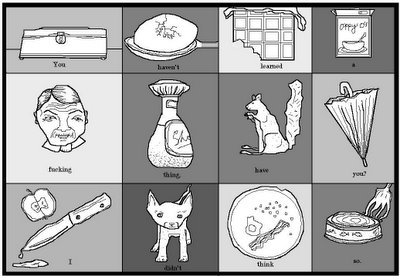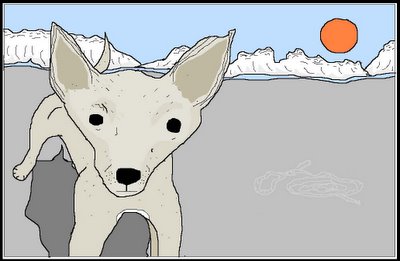Tuesday, February 28, 2006
Sunday, February 26, 2006
Thursday, February 23, 2006
Monday, February 13, 2006
Wednesday, February 08, 2006
Sunday, February 05, 2006
Giant Squid Essay Dare
About six months ago I essay-dared myself to write something about kittens and puppies. I'm not sure the results will ever see the light of day, but it did lead me to further essay dares, including this one. The dare was to write an essay about giant squids without a single scientific fact in it. Here is part of the results. You can see, however, I succumbed to the use of a fact or two. Still, I am happy to say, the results are as rigorously uninformative as one could hope for.
Giant squids, like many monstrous things, have a banished quality, as if it is their very hideousness has doomed them to lead hidden lives. Or is it their banishment that has made them hideous? That gelatinous oogiliness of a giant squid, that is so unfamiliar, so uncomfortably…other, suggests, to me at least, the dismayingly permeated state creatures captured in jars of formaldehyde take on after too many years, when they start waving boneless and ghostly, of their own accord, at the faintest of vibrations. Mostly though, a giant squid looks like an organ (stomach? uterus? intestines? a combination therein?) escaped from some unluckily disemboweled sailor or pirate, plopped into the ocean and sunk to the bottom, where, with unexpected initiative, it has prospered into its present state. It is ironic, perhaps, that the giant squid, the biggest-eyed creature on earth, could easily be the most challenging for the anime crowd to make into something adorable.
There might be a good phantom of the opera story in this: whirring about in a miniature submarine, a scientist’s eyes—a scientist with a steady, old-fashioned beauty about her—meet those of a giant squid across the ocean depths. The two begin a strange watery courtship, fraught with misunderstandings, confusion and hesitant tenderness. The scientist’s eyes have a drugged look every time she emerges from her submarine; the squid trolls about in aimless love-addled reverie. The scientist begins to alter her data to discourage oil companies from deep-sea drilling; the squid rescues her from certain death at great peril to itself. The romance continues until a rival scientist, helming a robot camera, comes upon them, the giant squid’s arms tenderly surrounding the miniature submarine in an illicit embrace…
To my amusement and secret perturbation, a perfunctory cruise through the internet yields contradictory accounts of whether the whales are attacking and eating the giant squids or the giant squids are attacking and eating the whales. It’s a testament to the giant squid’s status as part myth, part animal, for it’s hard to fathom where else there is such an essential confusion in a predator/prey relationship. Imagine, for instance, being unclear if the lions were eating the gazelles or the gazelles were eating the lions? But there are indeed enough sucker scars on and the occasional super-sized squid beak in a sperm whale’s stomach to indicate they are ingesting the occasional giant squid. I wonder if the whale, who also eats vast amounts of regular-sized squid, is gladdened by the sight of a giant one. If a human were to see a chicken the size of a moving truck running down the street, I would think the inclination, generally speaking, would be to hide behind a rock rather than chase after it with a cleaver, visions of dinner dancing in one’s head; however, a whale might very well feel differently.
I may have never formally studied giant squids, but I have discovered something important all the same: they are hard to draw. Harder even than a giant octopus, and my attempts to draw those most often look like a crappy last-minute Halloween ghost costume made out of an old sheet with a bunch of tentacles tacked on to the end. It’s the squid head in particular that is so unfathomable: hydrocephalic, fluted, icky, propulsive. But I encourage anyone to go ahead and take the time required for the suckers on the tentacles. The results are definitely worth it.
In the dim early morning hours of a recent personal crisis, I found myself returning again and again to the image of giant squids roaming through the sea murk, a lantern held up high in one tentacle. My fretful, sleep-muddled brain was trying to hatch some conundrum: each giant squid needed to hide from all the other giant squids but had to use a lantern to be able to locate where others were to do this; yet as soon as one giant squid saw a dot of light shining through the dark from another giant squid, they had to douse their own lantern so as not to be seen, which meant it started over again, the furtive roaming and spotting and dousing, and it was something that never, ever ended. It made for a strange and fitful sleep.
In a way I’m not surprised giant squids took a starring role in this confused little koan of mine, for they are one of the most psychologically suggestive of beasts. For in the relative sea of one’s consciousness, doesn’t one suspect there are a few giant squids lurking? Hasn’t a mysterious and frightening glob washed on shore from time to time? And deep in the recesses of your mind, aren’t there stories of something terrible and strange, perhaps imagined by way of those unsettling woodcut illustrations that make one feel a bit queasy? Every once in a while I will pause, while I’m washing my dishes or filing some papers at work and think: somewhere out there, unlocatable, is a giant squid, a real one, busy, swimming in black and fertile waters, as private as any creature can be; and the world suddenly seems bigger in a way I want to remember but always forget.





